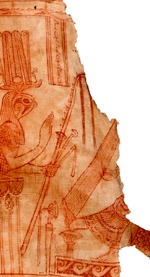Center, Textile Research

Egyptian Textiles and Their Production: ‘Word’ and ‘Object’
Date of this Version
3-2-2020
Document Type
Book Chapter
Citation
Published in Maria Mossakowska-Gaubert, ed., Egyptian Textiles and Their Production: ‘Word’ and ‘Object’ (Hellenistic, Roman and Byzantine Periods) (Lincoln, NE: Zea Books, 2020).
doi 10.32873/unl.dc.zea.1088
Abstract
Throughout the “papyrological millennium”, that is from the 3rd century BC to the 8th century AD, both administrative and private life in Egypt were largely based on letters. Apart from oral communication, letter writing, mostly on papyri and ostraca, was the only available form of communication for the inhabitants of the land of Nile when they needed to get in touch and exchange information with people who did not live in their immediate surroundings. Papyrus letters, written by and sent to private, ordinary people and not to the authorities, composed in the Greek vernacular and intended to fulfill a wide range of communicative goals, fall into the category of Greek private correspondence. These short, authentic, non-literary letters deal mainly with the practicalities of everyday life, including, of course, craftwork, business and financial issues. It is not, therefore, surprising that a considerable percentage of them are related to textile production and use. Textiles are, of course, but one of the numerous recurring topics to which these letters refer; yet both the quantity and quality of this evidence should not be ignored. The special value and interest of private papyrus letters — as compared to other kinds of non-literary papyri also containing information on ancient fabrics — lies in that they make it possible for us to explore the words or phrases of interest within a helpful linguistic environment. Moreover, letters often contain enough clues to enable the reconstruction of the situational context, especially when they are well preserved. The present paper focuses on a distinct category of private papyrus correspondence, that of request letters. My special focus will be on letters referring to demanding, urgent situations; these letters constitute striking proof of the crucial and irreplaceable role that request papyrus letters played in the processes of manufacturing, trading and use of Egyptian fabrics.
Included in
Africana Studies Commons, African Languages and Societies Commons, Classical Archaeology and Art History Commons, Fiber, Textile, and Weaving Arts Commons, History of Art, Architecture, and Archaeology Commons, History of Science, Technology, and Medicine Commons


Comments
Copyright © 2020 Aikaterini Koroli